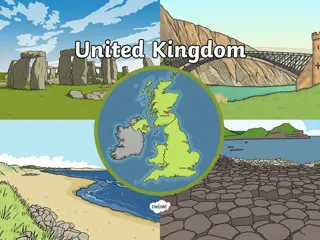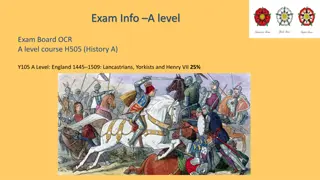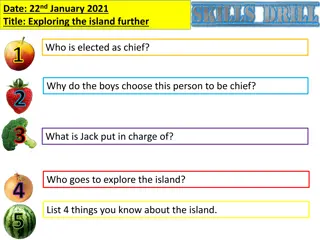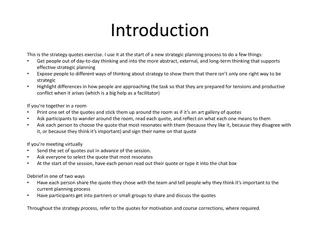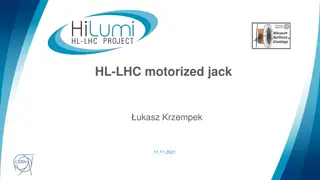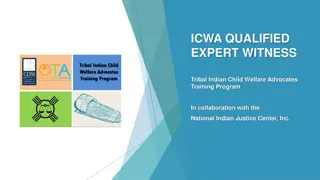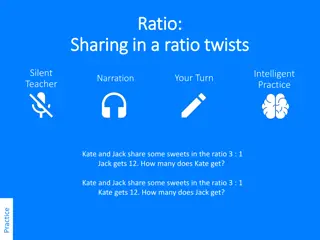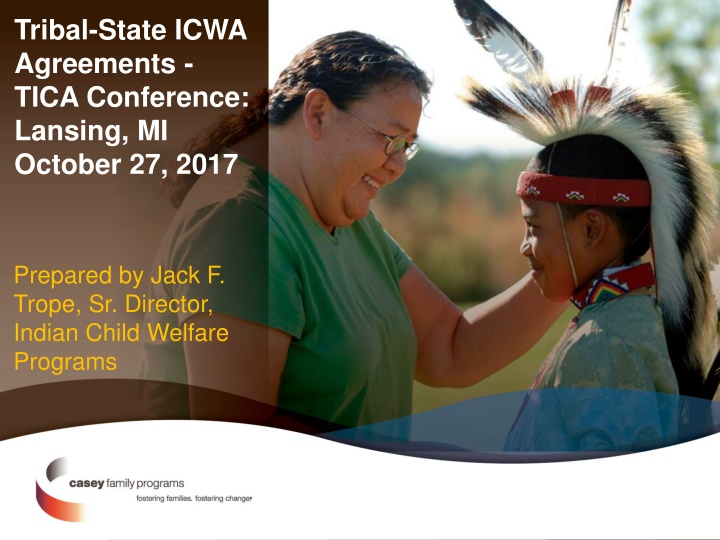
Indian Child Welfare Act of 1978 and Its Impact
Learn about the Indian Child Welfare Act of 1978, its foundations in tribal sovereignty, and the crucial role of tribes in protecting the well-being of tribal children. Explore the Act's provisions, tribal rights, and efforts to address disparities faced by American Indian/Alaska Native children in the child welfare system.
Download Presentation

Please find below an Image/Link to download the presentation.
The content on the website is provided AS IS for your information and personal use only. It may not be sold, licensed, or shared on other websites without obtaining consent from the author. If you encounter any issues during the download, it is possible that the publisher has removed the file from their server.
You are allowed to download the files provided on this website for personal or commercial use, subject to the condition that they are used lawfully. All files are the property of their respective owners.
The content on the website is provided AS IS for your information and personal use only. It may not be sold, licensed, or shared on other websites without obtaining consent from the author.
E N D
Presentation Transcript
Tribal-State ICWA Agreements - TICA Conference: Lansing, MI October 27, 2017 Prepared by Jack F. Trope, Sr. Director, Indian Child Welfare Programs
Indian Child Welfare Act of 1978 ICWA is based upon Indian Commerce Clause, plenary power of Congress, and trust relationship between federal government and Indian tribes/people Core of the Act is the recognition of tribal sovereignty and the important role of tribes in protecting the well- being of tribal children Response to problems identified in state child welfare systems Studies documented that 25-35% of Indian people separated from their families at some point in their lives, the vast majority had been placed with non-Native, non- relative families 2
Indian Child Welfare Act of 1978 Act pertains to children in state systems; it does not apply to children under tribal jurisdiction Purpose of Act: to curtail state authority Adds federal standards to state child welfare law 3
Indian Child Welfare Act of 1978 Congress recognized the important role of tribes in protecting the well-being of Indian children and keeping children connected with their tribal community and culture It also recognized that tribes had an interest in keeping children part of their communities if they are to survive and thrive in the future 4
Indian Child Welfare Act of 1978 Tribal rights o Right to Notice o Right to Intervene o Right to have case transferred to tribal court (subject to certain exceptions) o Exclusive jurisdiction over children resident and domiciled on the reservation or wards of the tribal court (except for limited circumstances) o Right to establish placement preferences 5
Disparity continues for American Indian/ Alaska Native children in care 18 American Indian/Alaska Native children 16 14 All other children of color 12 10 White children 8 6 4 2 0 2012 2013 2014 2015 2016
Federal Regulations: Overview June 14, 2016 ICWA Regulations Adopted First binding regulations since Act was enacted in 1978 Took effect on December 12, 2016 for all child custody proceedings commenced after that date In December 2016, revised ICWA Guidelines released based upon the new regulations which supersede both the 1979 and 2015 Guidelines 7
Tribal-State ICWA Agreements 25 U.S.C. 1919 States and Indian tribes are authorized to enter into agreements with each other respecting care and custody of Indian children and jurisdiction over child custody proceedings, including agreements which may provide for orderly transfer of jurisdiction on a case-by-case basis and agreements which provide for concurrent jurisdiction between States and Indian tribes. 8
AAIA Study Tribal-state ICWA agreements Association on American Indian Affairs (AAIA) prepared an analysis of tribal-state ICWA agreements under contract with Casey Family Programs; analysis also identifies promising practices and provisions in current ICWA agreements [as well as in an omnibus 1987 Washington State agreement recognized by state law] As of December 2016, AAIA found that there were 39 ICWA agreements involving 37 tribes in 10 states ICWA agreements are distinct from Title IV-E agreements although those agreements sometimes include ICWA provisions. A 2014 study of IV-E agreements found that there were 98 agreements in 16 states involving 267 tribes in 16 states as of December 2013 9
Purpose of ICWA Agreements Among other things, Agreements can Specify how the state is going to implement ICWA Establish how the state and tribe will work together when tribal children come in contact with the state child welfare system (institutionalize how the work will happen) Clarify jurisdictional issues Provide for supplemental funding Some of the provisions in existing Agreements are superseded by the regulations, but many are not 10
Key Provisions of ICWA agreements Background provisions Statements relating to cooperation, good faith, mutual respect Recognition of sovereignty oNo waiver of sovereign immunity 11
Key Provisions of ICWA agreements Background provisions example This Agreement is intended to coordinate the abilities and maximize the guidance, resources and participation of tribes in order to remove barriers from the process that impede the proper care of Indian children. The Agreement is directed at child welfare activities of the State through its local social services systems and attempts to impact the State s judicial systems. It represents the development of a comprehensive working relationship between each of the eleven tribes and the Minnesota Department of Human Services for the delivery of child welfare services The purpose of this Agreement is to protect the long term best interests, as defined by the tribes, Indian children and their families, by maintaining the integrity of the Tribal family, extended family and the child s Tribal relationship [Minnesota] 12
Key Provisions of ICWA agreements Clarification of key definitions Acknowledgment or establishment of paternity Best interest Consultation Extended family 13
Key Provisions of ICWA agreements Clarification of key definitions - examples Acknowledgment [of paternity] means any action on the part of the unwed father to hold himself out as the biological father of an Indian child. Acknowledgedfather also means a father as defined by tribal law or custom [Minnesota] Best interests of an Indian child means compliance with and recognition of the importance and immediacy of family preservation and using tribal ways and strengths to preserve and maintain an Indian Child s family. The Best Interests of an Indian Child will support that child s sense of belonging to family, Extended family, clan and tribe [S]tate bestinterests standards that are applied in circumstances involving non-Indian children are different than Best Interest of an Indian child [Saginaw-Chippewa Michigan] 14
Key Provisions of ICWA agreements Clarification of key definitions - examples Consultation between the state and tribal government shall include real and full dialogues, not just exercises to meet procedural requirements. Tribal-state consultation should be a process of decision-making that works cooperatively toward reaching a true consensus before a decision is made or action taken [Tulalip Washington] Extended family means the child s grandparent, aunt or uncle, first and second cousins, stepparent, godparent, or other individual approved by consensus through a Navajo family clan. [Navajo Arizona] 15
Key Provisions of ICWA agreements Jurisdictional Issues Public Law 280 o Deference to tribal court Transfer of cases to tribal court o State support Intervention o Access to information if choose not to intervene 16
Key Provisions of ICWA agreements Notice Requirements Specific process o Informal notice Voluntary proceedings Emergency proceedings 17
Key Provisions of ICWA agreements Notice Requirements - examples Emergency proceedings o Within 48 hours by telephone, followed by formal written notice (Navajo-Arizona) o By telephone as soon as possible (Saginaw Chippewa Michigan) o 24 hour notice by telephone (New Mexico) o Prior to removal if possible; if not, next business day (Ysleta del Sur Pueblo Texas) o Within 2 working days (Navajo Utah) o By writing, phone, fax or mail within 24 hours (Quinault, Makah, Samish and Port Gamble Washington) o Immediately by telephone (Shoalwater Bay Washington) o Immediately by telephone or e-mail (Tulalip Washington) 18
Key Provisions of ICWA agreements Qualified Expert Witnesses (QEWs) Process for Identifying Criteria List of Approved QEWs 19
Key Provisions of ICWA agreements Placement Preferences Identify different tribal order Agreement on what constitutes good cause Agreement on process for identifying/approving of placement Process to recruit more preferred foster homes Ongoing obligation to place in preferred homes ICPC placements 20
Key Provisions of ICWA agreements Placement Preferences example Placement [by the state agency] shall always take into account the child s extended family and cultural affiliation and shall be made in accordance with the priorities set out in the Lummi Code of Laws (Children s Code) as amended from time to time. At present those priorities are: With grandparents; With other adult relatives; With tribal members of the child s tribe; With members of other tribes; With community members; and With non-tribal members who are sensitive to and committed to encourage and maintain the child s access to the child s inherent tribal heritage, culture, traditions and history; and contact with the child s tribe [Lummi Washington] 21
Key Provisions of ICWA agreements Case Management Cooperation Cooperation/coordination Services Staffing Training Case planning Funding Private agencies 22
Key Provisions of ICWA agreements Case Management Cooperation examples DCFS shall involve the Tribe s Social Services/ICWA at the earliest possible point in social services intervention with Indian families, to: a. Facilitate communication with the Indian family. b. Prevent unnecessary removal of Indian children from their caretakers. c. Secure emergency placement with an Indian relative or an Indian foster home whenever possible. d. Assist in compliance with the notification requirements of the ICWA. e. Assist in securing reliable identification of Indian children. f. Assist in the placement of Indian children in appropriate homes. [Goshute (Confederated Tribes) Utah] 23
Key Provisions of ICWA agreements Case Management Cooperation examples The Tribal and [state agency] social workers will work collaboratively to develop a case plan for the child. [Cowlitz, Samish, Jamestown S Klallam Washington] Services in the community specifically designed for Indian families are to be used when available, including resources of the extended family, the tribe, urban Indian organizations, tribal family service programs and individual Indian caregivers, e.g., medicine men or women, and other individual tribal members who may have developed special skills that can be used to help the child s family succeed. [Paiute, Goshute, Northwestern Shoshone Utah] 24
For Further Information The entire document can be found on the Association on American Indian Affairs website: https://www.indian- affairs.org/uploads/8/7/3/8/87380358/icwa_trib al-state_agreements_report.pdf It is also expected that the document will be posted on the NARF/NILL website soon. 25
For Further Information Jack F. Trope Senior Director ICWP jtrope@casey.org 26





